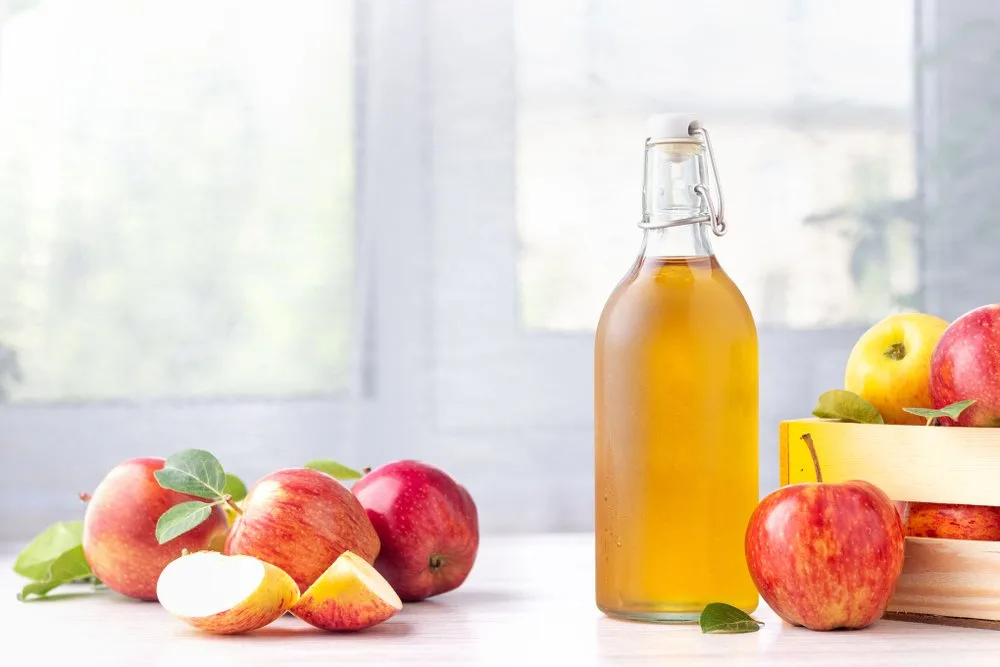Apple cider vinegar (ACV) is readily touted as the ultimate health elixir. Made from fermented apples, the fermentation process turns the apples into alcohol and creates the byproduct acetic acid, which is considered the source of apple cider vinegar’s benefits.
Now, while it may be the ultimate longevity drink, too much of a good thing may be a health risk, and there have been concerns raised about the possible side effects of ACV.
6 Potential Side Effects of Apple Cider Vinegar
1. Gastrointestinal Issues
Gastrointestinal health refers to the stomach and intestines, and it appears that drinking too much apple cider vinegar may impair their health.
The gastric emptying rate refers to the speed at which it takes food to empty out of your stomach and into the small intestine. Per one study, apple cider vinegar can delay this process, increasing the risk of gastroparesis, which causes nausea, vomiting, and abdominal pain.
2. Esophageal Issues
Apple cider vinegar is acidic, and this may cause some irritation, or even burning to your throat.
Dr. Michelle Jaelin, RD, president of Nutrition Artist in Ontario, Canada, tells Everyday Health that ACV is “an acid and can damage the lining of the esophagus if taken straight like a shot.”
3. Interacts With Other Medications
According to Dr. David L. Katz, MD, MPH, an Internal Medicine, Preventive Medicine/Public Health, and Lifestyle Medicine specialist with particular expertise in nutrition, apple cider vinegar may interfere with certain medicines, particularly diuretics, laxatives, and insulin.
If you are taking any of these medications, do speak to your doctor before incorporating ACV into your routine.
4. Decreased Potassium Levels
The body uses potassium to regulate fluids, muscle contractions, and nerve signals, but it appears that consuming too much ACV may hinder this by causing a reduction in potassium levels. Unfortunately, low levels of potassium can lead to hypokalemia. This condition is exhibited by irregular heart rhythms, muscle weakness, fatigue, and muscle cramps.
That said, it should be noted that there have yet to be any controlled studies on ACV’s effects on potassium levels, with the only existing evidence being anecdotal. According to the study, a 28-year-old woman consumed 250 ml of apple cider vinegar diluted in water every day for 6 years before being admitted to the hospital with low potassium levels, osteoporosis, and other blood abnormalities.
5. Tooth Erosion
“Vinegar is highly acidic. It can severely damage tooth enamel.” – Dr. David L. Katz.
Enamel erosion can come with a host of dental issues that include stained and overly sensitive teeth, and tooth decay.
6. Skin burns
For many, apple cider vinegar is also considered a skincare ingredient. It’s often used as a toner due to the product’s ability to balance the skin’s pH. Yet, due to its strong acidic nature, applying ACV directly to the skin can cause skin irritation and even burns. If you are hoping to include ACV into your skincare routine, please consult a dermatologist first.
Is there a safe way to consume ACV?
Listen, ACV has some pretty great benefits, so the good news is that you can consume it safely, but it’s all about portion control.
Speaking to Women’s Health Magazine, registered dietitian Eliza Savage said that ACV should always be diluted and advised that you “Start with one to two teaspoons of diluted ACV with eight ounces of water and progress up to one tablespoon mixed with eight ounces of water.”
It would also be advisable to rinse your mouth with water after ingesting ACV so that you can protect your teeth’s enamel.
References
Lhotta, K., Höfle, G., Gasser, R., & Finkenstedt, G. (1998). Hypokalemia, hyperreninemia and osteoporosis in a patient ingesting large amounts of cider vinegar. Nephron, 80(2), 242–243. https://doi.org/10.1159/000045180
Liljeberg, H., & Björck, I. (1998). Delayed gastric emptying rate may explain improved glycaemia in healthy subjects to a starchy meal with added vinegar. European journal of clinical nutrition, 52(5), 368–371. https://doi.org/10.1038/sj.ejcn.1600572



![women [longevity live]](https://longevitylive.com/wp-content/uploads/2020/01/photo-of-women-walking-down-the-street-1116984-100x100.jpg)










